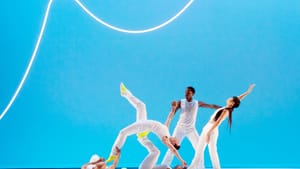Stay in the Loop
BSR publishes on a weekly schedule, with an email newsletter every Wednesday and Thursday morning. There’s no paywall, and subscribing is always free.
Dance as fine dining
The Annenberg and NextMove present Jessica Lang Dance

In November, Jessica Lang Dance surprised fans by announcing that the company would disband in April, after its current touring season. Although I found the evening at the Annenberg a little uneven, world premiere "us/we" shines.
During the artists’ conversation after the November 30 performance, Lang compared a dance program to a meal and said she tries to offer a variety of styles — the audience doesn’t want a whole evening of dessert. These five dances lived up to her mission.
Lang’s lightness and “Glow”
“Solo Bach” opened the evening with selections from Bach’s Six Sonatas and Partitas for Violin Solo. Patrick Cocker danced with the lightness I expect from Lang, who deftly combined classic and modern elements, and even hinted at Baroque dance. However, it is barely an amuse-bouche, so slight I passed over it in last year’s review. It seemed strange to bring it back this year. The excerpt from “Aria” kept the music in the Baroque period with Handel’s gorgeous “Qual Nave” from the opera Radamisto. The trio (Julie Fiorenza, Eve Jacobs, and Laura Mead, in Fritz Masten’s flowing red dresses) could have stepped off a Grecian urn. The dance incorporated elements of Martha Graham and Isadora Duncan, including the iconic Duncan circle with upraised clasped hands. But if dance is a meal, we hadn’t reached the salad yet.
“Glow” certainly gave us something different. A curving swoosh, like a barely-there signature of light designed by Lang and lighting designer Nicole Pearce, dominated the stage. The company frolicked in white pants and shirts and lime-green shoes, sometimes jumping over the lowest curve of the light. The music, “2+1” by Ivan Trevino and “Fractalia” by Clay Condon, added to the playful, airy feeling with modernist marimbas that could almost have been electronica.
Welcoming the main course
If the first act was a selection of hors d’oeuvres, “us/we” was the main course. The title let us know what we were going to see: us/we instead of us/them; but also, the creators of the piece told us, it stands for “the U.S. welcomes.” The goal, they said, was to express the issues of the day from the perspectives of the personal stories the news never covers. Set in four parts, the piece gave us city life from the view under the El.
The piece moved beyond the hierarchy that makes lighting and scenic design accessories to the dance. Lang, artist José Parlá, and costume designer Moriah Black described a process so collaborative that some of the costumes were made from the cloths Parlá used to clean up after painting. The stains from his paint make the patterns on the cloth. The result was my favorite piece of the night: not just a dance but a multimedia event. Parlá’s video art seemed to partner the dancers.

Bringing the city to life
The dance opened to an abstract backdrop, a Pollock-like paint-splattered wall. The dancers stood with their backs to us in those paint-stained costumes, rocking from foot to foot, marching slowly toward that wall. It was a moment of resignation, and the whole section felt like the “before” of refugees’ flight — death and escape, but also ties to the past and those left behind.
Part two lands us firmly in New York City, where we stay for the rest of the ballet, the dancers now in a patchwork of streetwear costumes. There is sorrow here too, but also joy. With the El rattling on video behind them, a dancers’ version passes across the stage, four men in a row, carrying their partners as passengers sitting on their shoulders.
The soundscape guided us through the piece. David Lang’s “Our Land, Our Peace, and Our Common Fate,” from his national anthems, combined single lines from the national anthems of countries around the world and set them to evocative music that was sometimes hopeful, sometimes mournful. In my favorite piece of the night, Ram Jam’s “Black Betty” and El Michels Affair’s “El Pueblo Unido” brought the city to life, and the metronomic ticktock and spoken word gave urgency to the action.
Dessert and goodbyes
The program ended, suitably, with dessert: “This Thing Called Love,” set to the music of Tony Bennett. In Braden McDonald’s costumes, black suits with white piping on the jackets and white shirts and ties, the piece was smooth jazz with a Broadway feel to it. In my favorite bit, the company clustered at center stage with jazz hands to represent the sun shining in “I Left My Heart in San Francisco.”
If you decided to sit Jessica Lang out this year in Philly, your closest chance to see the company before they say goodbye is in Pittsburgh on January 26 — and “us/we” is worth the trip.
You can help keep BSR going strong in 2019 and beyond. Make your gift here.
What, When, Where
Jessica Lang Dance, 2018-2019 tour. Choreography by Jessica Lang. Jessica Lang Dance. November 30 through December 1 at the Zellerbach Theater of the Annenberg Center for the Performing Arts, 3680 Walnut Street, Philadelphia. (215) 898-3900 or jessicalangdance.com.
Sign up for our newsletter
All of the week's new articles, all in one place. Sign up for the free weekly BSR newsletters, and don't miss a conversation.

 Camille Bacon-Smith
Camille Bacon-Smith